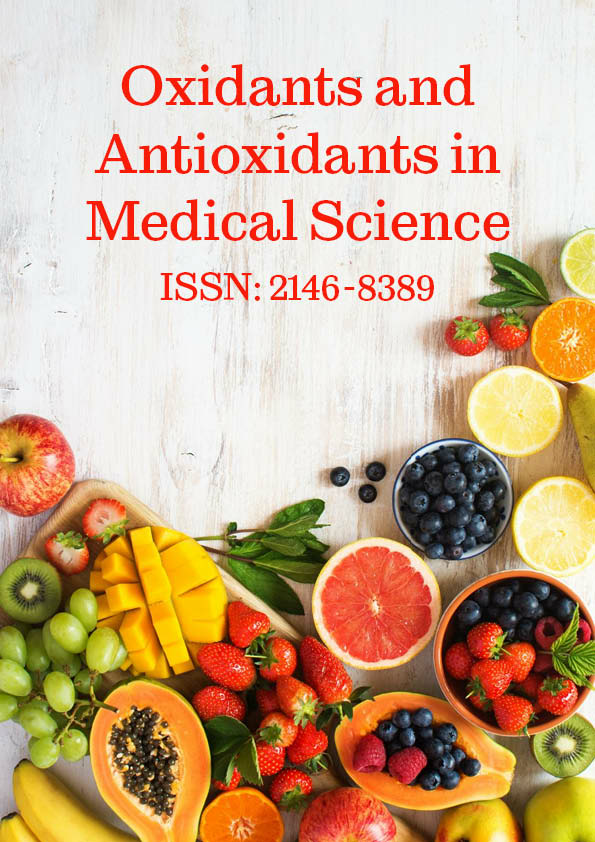Perspective Article - Oxidants and Antioxidants in Medical Science (2023)
Zinc Requirements for Proper Infant Growth and Development
Bahak Bitar*Bahak Bitar, Department of Food Science, Jordan University of Science and Technology, Irbid, Jordan, Email: bahakb@edu.lb
Received: 25-Jul-2023, Manuscript No. EJMOAMS-23-113858; Editor assigned: 28-Jul-2023, Pre QC No. EJMOAMS-23-113858 (PQ); Reviewed: 11-Aug-2023, QC No. EJMOAMS-23-113858; Revised: 18-Aug-2023, Manuscript No. EJMOAMS-23-113858 (R); Published: 25-Aug-2023
Description
Zinc is a vital mineral that plays a crucial role in various physiological processes within the human body, includ- ing growth, development, and immune function. It is particularly essential for infants as they are in the early stages of life and require adequate nutrition for healthy growth and development. While zinc offers numerous benefits to infants, it is equally important to understand the potential side effects of its overdose. This article ex- plores the benefits of zinc for infants and the possible side effects of excessive zinc intake [1].
Benefits of zinc for infants
Growth and development: Zinc is essential for the growth and development of infants. It plays a critical role in cellular division and the synthesis of DNA, which are fundamental processes for the growth of tissues and organs.
Immune system support: Zinc is known for its im- mune-boosting properties. It helps the body produce and activate immune cells, which are crucial in defend- ing against infections. In infants, a strong immune system is vital for protection against common childhood illnesses.
Cognitive development: Zinc is also involved in cogni- tive development. It aids in the formation and function of neurotransmitters, which are essential for brain func- tion and learning. Ensuring an adequate intake of zinc can positively impact an infant’s cognitive abilities.
Wound healing: Zinc is essential for wound healing and tissue repair. In the event of minor injuries or skin irri- tations, having sufficient zinc in the body can help speed up the healing process, keeping the infant comfortable and healthy.
Taste and smell perception: Zinc is necessary for the development of taste and smell receptors. Infants with a balanced intake of zinc are more likely to have a well-de- veloped sense of taste and smell, which can influence their feeding habits and overall nutrition [2-5].
Potential side effects of zinc overdose
While zinc is crucial for infant health, excessive intake can lead to adverse effects. Here are some potential side effects of zinc overdose in infants:
Gastrointestinal distress: Excessive zinc intake can lead to stomachaches, nausea, vomiting, and diarrhea. These symptoms can be particularly distressing for in- fants and may interfere with their feeding and overall well-being.
Decreased immune function: Paradoxically, excessive zinc intake can impair immune function. It may disrupt the balance of other essential minerals, like copper, in the body, leading to a weakened immune system.
Copper deficiency: Prolonged high levels of zinc can interfere with the absorption of copper, another im- portant mineral. Copper deficiency can result in anemia, bone problems, and neurological issues in infants.
Reduced appetite: Zinc overdose may lead to a de- creased appetite in infants, which can impact their over- all nutrition and growth. This is particularly concerning since infants require proper nourishment during their early years.
Neurological symptoms: In severe cases of zinc over- dose, infants may experience neurological symptoms such as lethargy, tremors, and seizures. These symp- toms require immediate medical attention.
Lowered iron absorption: Excessive zinc can interfere with the absorption of iron, which is critical for prevent- ing iron-deficiency anemia. Infants already have a higher risk of iron deficiency, and too much zinc can exacerbate this issue [6-8].
Preventing zinc overdose in infants
To ensure the benefits of zinc without the risk of over- dose, it’s crucial for parents and caregivers to be mindful of their infant’s zinc intake.
Breastfeeding: Breast milk is a natural source of zinc and provides infants with the appropriate amount need- ed for their growth and development. If not breastfeed- ing, choose a formula specifically designed to meet the nutritional needs of infants.
Balanced diet: As infants transition to solid foods, it’s important to provide a balanced diet that includes zinc- rich foods like meat, poultry, dairy, beans, and fortified cereals.
Supplements: Only administer zinc supplements to in- fants under the guidance of a healthcare professional. Avoid over-the-counter supplements without medical advice.
Be cautious with zinc-containing remedies: Zinc is often found in over-the-counter cold and cough reme- dies. Always consult a healthcare provider before using such products for infants [9,10].
References
- Ackland ML, Michalczyk AA. Zinc and infant nutrition. Arch Biochem Biophys 2016;611:51-57.
[Crossref] [Google Scholar] [Pubmed]
- Krebs NF. Zinc supplementation during lactation. Am J Clin Nutr 1998;68(2):509S-12S.
[Crossref] [Google Scholar] [Pubmed]
- Irfan O, Black RE, Lassi ZS, Bhutta ZA. Zinc supplementation and the prevention and treatment of sepsis in young infants: a systematic review and meta-analysis. Neonatology 2022;119(2):164-175.
[Crossref] [Google Scholar] [Pubmed]
- Walker CF, Black RE. Zinc and the risk for infectious disease. Annu Rev Nutr 2004;24:255-275.
[Crossref] [Google Scholar] [Pubmed]
- Yuan X, Qian SY, Li Z, Zhang ZZ. Effect of zinc supplementation on infants with severe pneumonia. World J Pediatr 2016;12:166-169.
[Crossref] [Google Scholar] [Pubmed]
- Maret W, Sandstead HH. Zinc requirements and the risks and benefits of zinc supplementation J Trace Elem Med Biol 2006;20(1):3-18.
[Crossref] [Google Scholar] [Pubmed]
- Driscoll MS, Kwon EK, Skupsky H, Kwon SY, Grant-Kels JM. Nutrition and the deleterious side effects of nutritional supplements. Clin Dermatol 2010;28(4):371-9.
[Crossref] [Google Scholar] [Pubmed]
- Dardenne M. Zinc and immune function. Eur J Clin Nutr 2002;56(3):S20-23.
[Crossref] [Google Scholar] [Pubmed]
- Grissinger M. A fatal zinc overdose in a neonate: confusion of micrograms with milligrams. P T 2011;36(7):393.
[Google Scholar] [Pubmed]
- Bharadva K, Mishra S, Tiwari S, Yadav B, Deshmukh U, Elizabeth KE, et al. Prevention of micronutrient deficiencies in young children: consensus statement from infant and young child feeding chapter of Indian Academy of Pediatrics. Indian Pediatr 2019;56:577-586.







